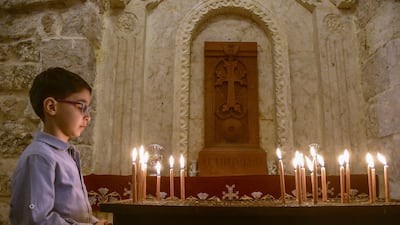Christians in Aleppo, the major Syrian city retaken from President Bashar Al Assad's regime by extremist-led rebels, are starting to “decorate our neighbourhoods with Christmas trees", the city's lead bishop said amid speculation of the status of minorities.
Rebel group Hayat Tahrir Al Sham (HTS), a US-designated terrorist organisation that has sought to present a more moderate image, is leading a coalition of opposition fighters in the most significant challenge to the Assad regime in years.
The regime quickly fell in Aleppo, a city of 2.5 million people that is home to about 25,000 Christians, and opposition forces are moving further south.
The community's Christians were initially “fearful”, said Bishop Hanna Jallouf, the ordained bishop and Apostolic Vicar of Aleppo of the Latins.
Speaking from Aleppo, he gave a virtual briefing to reporters in Washington on Tuesday, describing how the city's religious minorities initially refrained from “leaving their homes” in the first hours of the shock operation by the extremist-led rebel forces. But with reassurances from HTS that Christians would be safe, religious minorities quickly re-emerged into public life.
“I'm excited to say that both the Catholic and Orthodox and other Christian sects' celebrations, whether it is St Barbara, New Year's and Christmas is going as normal,” Bishop Jallouf said. “We've already started to decorate our neighbourhoods with Christmas trees and other sort of things for the upcoming holidays … We feel that things are going OK.”
There has been growing concern that HTS control in Syria could endanger Christian minorities. In its 2023 country report on international religious freedom, the US State Department noted that “human rights organisations continued to report HTS committed abuses against members of religious and ethnic minority groups, including the seizure of properties belonging to displaced Christians".
Amid the renewed fighting, Syrian Christians are also fearful for their sacred landmarks. The Catholic church announced this week that “during a bombing of the city of Aleppo, a bomb fell on the Franciscan complex of the Terra Santa College".
“The word of God of this first Sunday of Advent invites us to keep hope alive for a prospect of peace. Let us take this exhortation and pray that it be achieved for our Syrian brothers and sisters, the statement added.
As HTS and a coalition of rebel factions gain ground across Syria, the group on Monday issued a statement trying to ease the fears of minorities such Syrian Kurds, declaring they “have the full right to live in dignity and freedom, as do all the Syrian people".
“In the future Syria, we believe that diversity is our strength, not our weakness,” HTS added.
Bishop Jallouf said that his “biggest fear in the coming days is Russian bombardment … the aerial bombardment of civilian areas, and we really pray that that somehow ceases".
The Russia and Iran-backed Assad regime has long promoted itself as secular and the protector of Syria’s minorities – including the Christian, Alawite, Shiite or Druze communities – from extremists.
For many, those claims were vindicated earlier in the war amid an ISIS takeover that at its height saw the group seize control of about one-third of Syria and 40 per cent of Iraq.
During that time, ISIS perpetrated a campaign of mass atrocities to “achieve the religious and ethnic cleansing of Yazidis, Assyrian-Chaldean-Syriac Christians, Shiite and Sunni Muslim Turkmens, Shabaks and other religious minorities in Iraq and Syria", according to the US Commission on International Religious Freedom.


